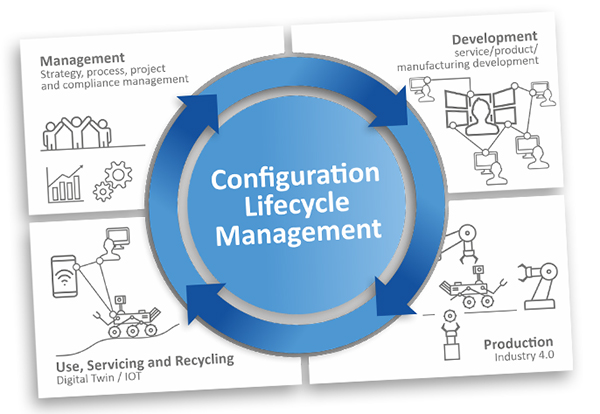PROSTEP is bringing a lean, smart web application for generating digital threads to market: OpenCLM ensures data transparency across domain boundaries and makes it possible for everyone involved to trace deliverables and decisions. This makes it easier for companies to get to grips with complex development projects and respond agilely to new requirements.
Ensuring end-to-end digitalization (digital thread) across different domains involves a considerable amount of effort on the part of those responsible in companies today. Data is typically distributed across a large number of data silos and has to be collated and linked manually. OpenCLM significantly reduces the amount of time and effort this involves. The software creates a directed web of relationships between the information objects in the individual domains. This makes it possible to locate information in heterogeneous system landscapes, record and analyze correlations and statuses, generate reports automatically and meet compliance requirements.
OpenCLM creates digital threads throughout the entire product lifecycle, providing support for a variety of different use cases. Looking forward, the application is used to manage project progress, monitor the quality and compliance of the project results, and communicate changes across domains. Looking backwards, it allows impact analyses, defect management and helps meet traceability requirements in the context of audits.
With OpenCLM, we are not offering our customers a new super PDM but rather a lightweight web application that merely links the information objects in the domain systems and provides users with the information they need to perform their work. We want to help them exploit the potential of the digital thread without them having to change their IT landscapes or processes.”
Our new digital thread application connects heterogeneous system landscapes (PDM/PLM, ERP, ALM (Application Lifecycle Management), etc.) via our proven OpenPDM integration platform and supplements them with additional integration and function modules. Its core functions include the integration of process and project management, maturity validation, the planning of milestones and deliverables (tasks), the coordination of cross-domain changes, and the generation and management of trace links and configurations.
OpenCLM makes it possible to link data and documents from different source systems instead of replicating them while at the same time giving due consideration to process requirements. The links are independent of the IT systems used and remain unchanged even when switching to a new system. The linked data objects are displayed with metadata such as status, change date, owner, etc. in a clear and concise cockpit, so that they can be easily compared with other data statuses.
So-called baselines can be created for milestones, given points in time, etc. in order to record certain information. If required, they can also be exported, exchanged or archived in standardized formats. Reusable project and process templates ensure consistent and compliant project and product documentation, as required for certification purposes for example.
More information about OpenCLM and the supported use cases can be found on our homepage or in the new white paper.

By Steven Vettermann
